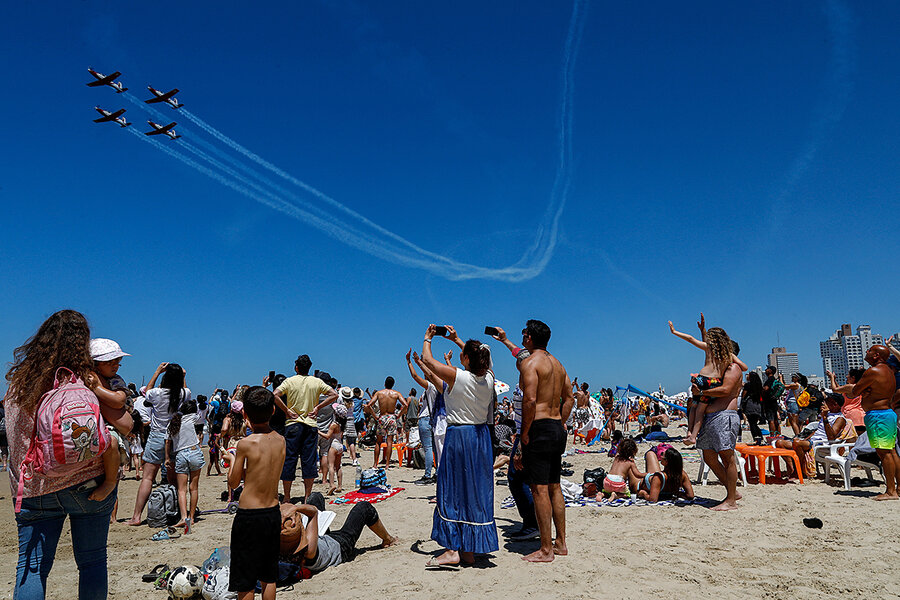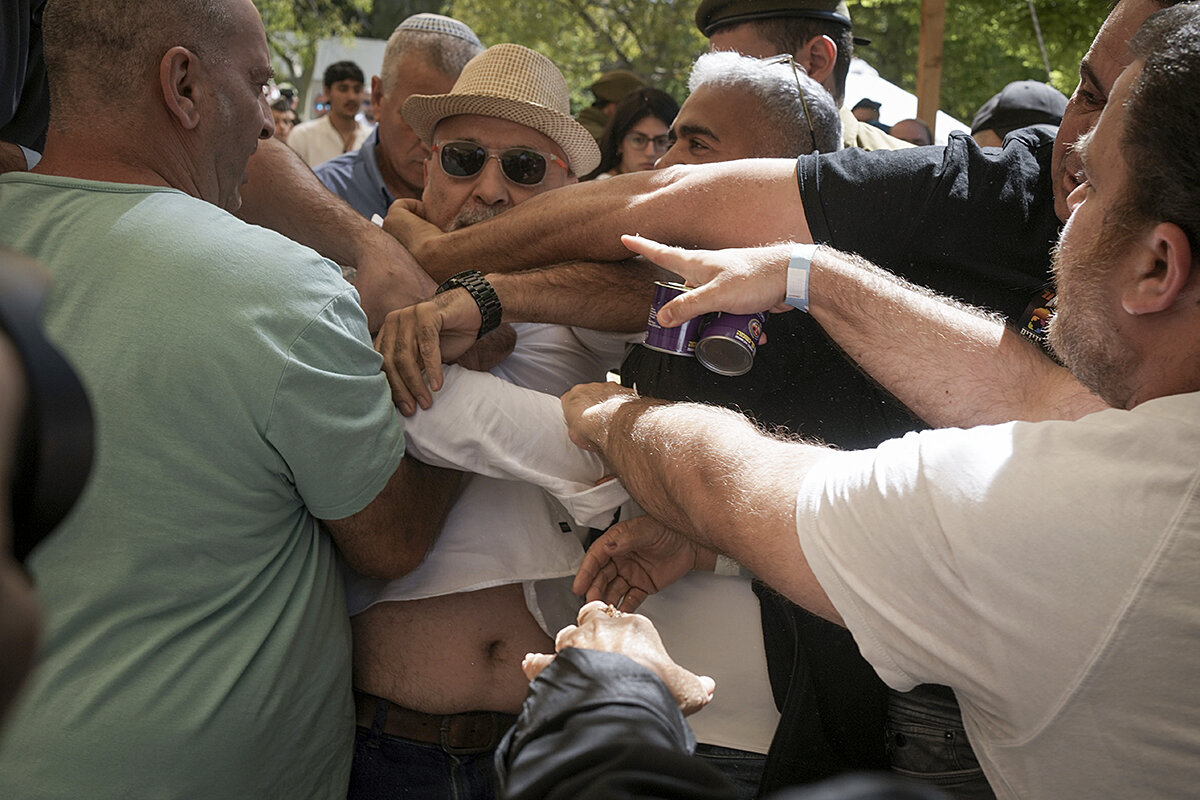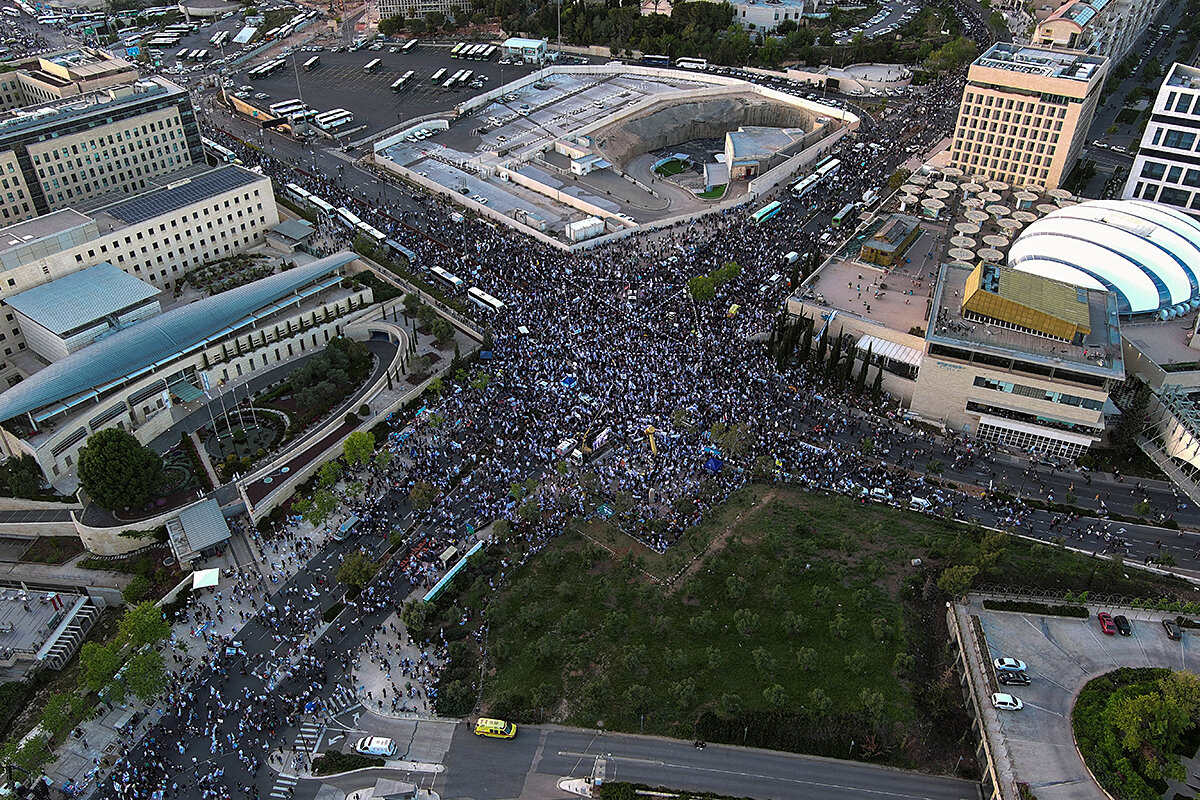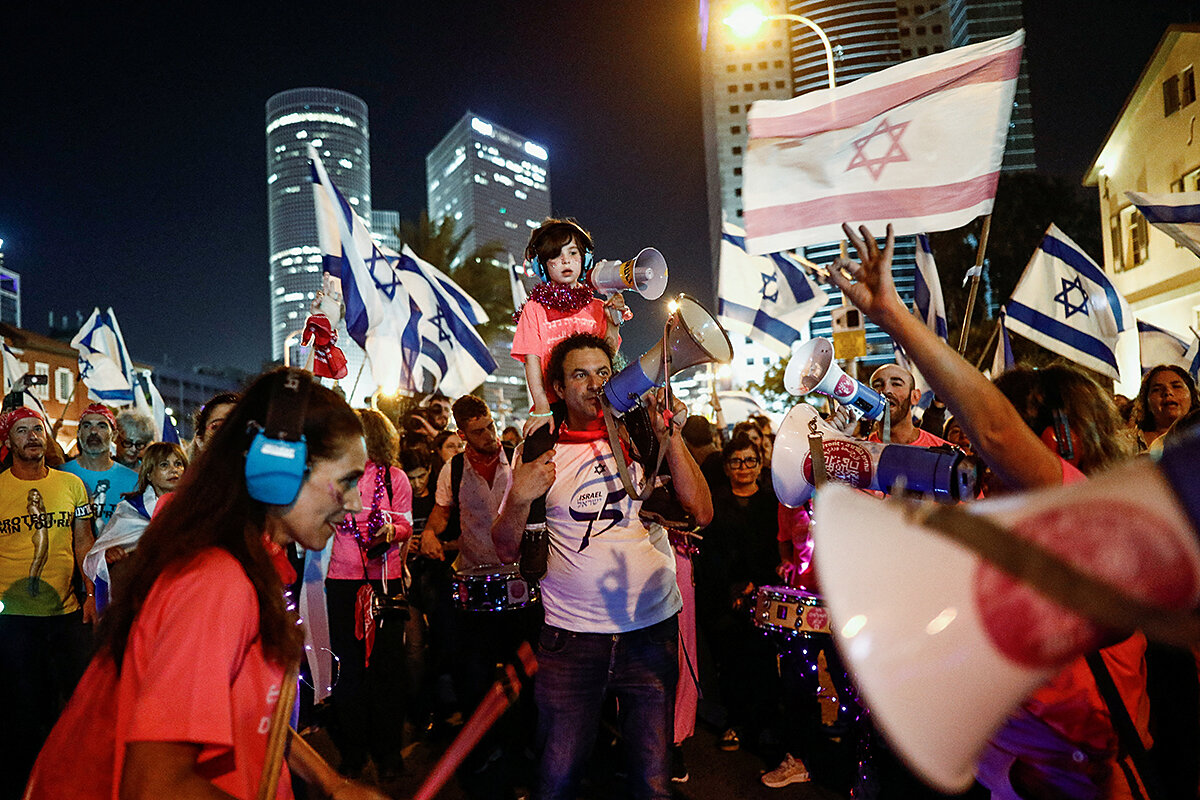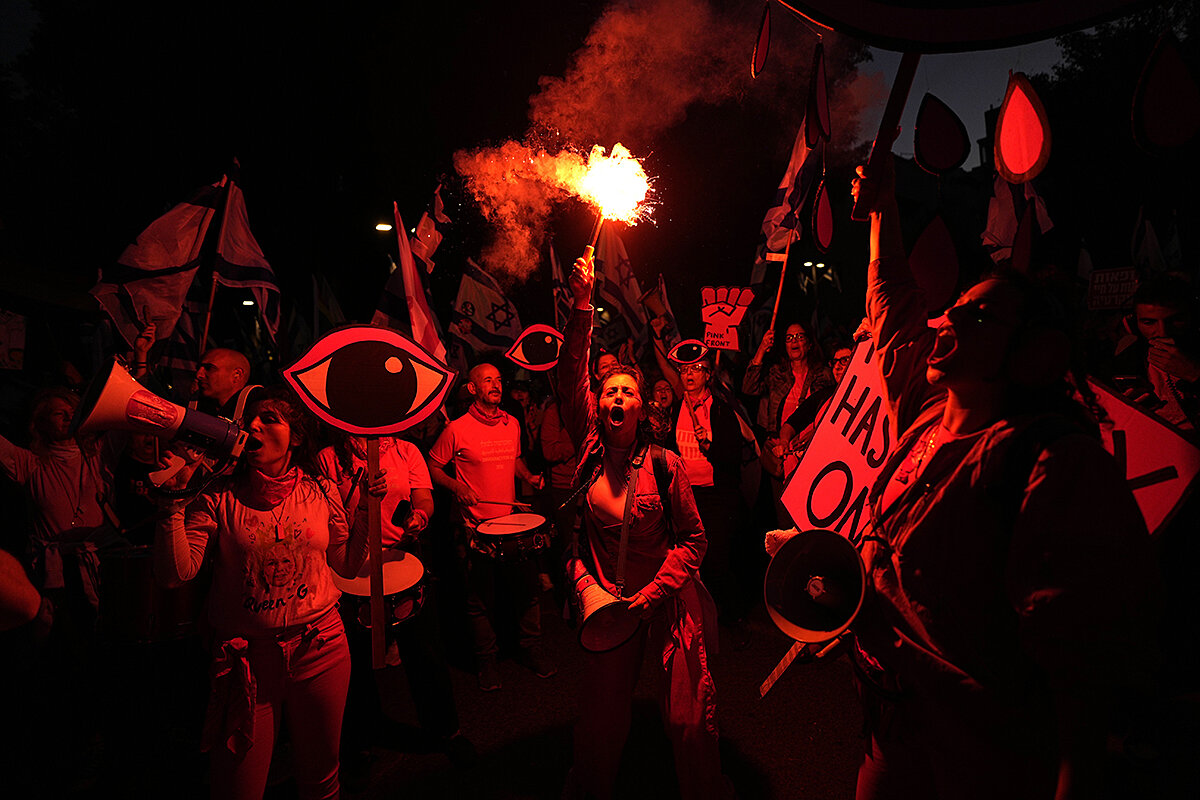Israel at 75: Can a divided nation reconcile its differences?
Loading...
| JERUSALEM
Israel’s marking of its 75th Independence Day was supposed to be a celebratory event, a day of national unity.
Instead, the milestone last week and the solemn, annual Memorial Day that immediately preceded it were marred by deep social divisions over urgent matters like the government’s plan to overhaul the judiciary as well as existential debates surrounding liberal democratic values and Jewish identity.
Bereaved families scuffled with each other among the graves of fallen loved ones at military cemeteries. Protests forced government officials to cancel their participation at memorial ceremonies. Opposition leader Yair Lapid boycotted the state Independence Day ceremony.
Why We Wrote This
A story focused onFor months, Israelis have protested proposed judicial reforms. But as events around Israel’s 75th anniversary made clear, the divisions roiling its society are even more fundamental, threatening consensus on democracy, Judaism, and Zionism.
Tellingly, Prime Minister Benjamin Netanyahu repeatedly stressed “unity” in multiple speeches – even invoking the 40 years Jews spent wandering in the desert in the Book of Exodus as a lesson to be heeded on the need to resolve disputes – and the Israel Air Force’s country-wide flyover was held under the theme of “Together all the way.”
Yet if the disruptions to the ceremonies were not as widespread as had been feared, the pall of division was emphasized by the continuation of anti-government protests into a fifth month. A large rally was held in Tel Aviv on the festive eve of Independence Day, followed by the weekly nationwide demonstrations Saturday night.
Sandwiched in between was a government-organized mass demonstration in Jerusalem last Thursday that drew more than 200,000 people, a major show of force for right-wing Israelis who support plans to circumscribe the power of the judiciary.
Israeli President Isaac Herzog, who for months has sought to resolve the crisis over the government’s proposals, reiterated his dire warnings about national divisions.
“There is no greater existential threat to our people than the one that comes from within,” he told a Jewish American conference last week in Tel Aviv. “The fierce debate over Israel’s direction in recent months is a striking example of the ways that alienation between different groups, and polarization that festers for years, becomes corrosive.”
Cracked mirror
The dueling demonstrations were an indication of just how alienated and polarized the two sides of Jewish-Israeli society have become: one people residing in a single country but split by vastly different conceptions of democracy, Zionism, and Judaism.
In Jerusalem, right-wing demonstrators congregated under banners declaring that an unnamed “they” would “not steal my election” and calling for an end to the “Supreme Court dictatorship.” A coalition including ultranationalist and religious parties had, indeed, won a parliamentary majority last fall that returned Mr. Netanyahu to the premiership. Now those same voters – sporting yarmulkes and traditional dress, and many apparently from West Bank settlements – were demanding “judicial reform.”
“Look how much power we have,” declared Finance Minister Bezalel Smotrich from the far-right Religious Zionism party. “They have the media, they have the tycoons that fund their protests, but we have the people on our side.”
Omri, a secular Likud voter from central Israel, says he hadn’t attended a demonstration in at least two decades. “But things added up,” he explains in Jerusalem. “The Left has been breaking all the taboos, including [protests] on Memorial Day and not respecting democratic results, so I wanted to come out and give my support. It’s not just about judicial reform.”
The cracked-mirror image with the series of anti-government protests was evident throughout at the pro-government rally, from the sea of blue-and-white Israeli flags to rhythmic chants of “de-mo-cra-cy” to youngsters holding out tin cans for donations (in this case to build new settlements).
Then in Tel Aviv over the weekend, as in all previous weeks, the same flags and chants for democracy from the other side.
“We are the majority, and we’ve taken to the streets!” the less modestly dressed and mostly secular protesters yelled. Instead of pulsating religious music, the soundtrack was Israeli pop and rap.
Instead of rabbinic incantations, loudspeakers in Tel Aviv played Israel’s founding father, David Ben-Gurion, reading out the Declaration of Independence, including the key provision that the state “will ensure complete equality of social and political rights to all its inhabitants irrespective of religion, race, or sex.” A sizeable group held aloft Palestinian flags under signs declaring: “No democracy with occupation.”
Deepening demands
As with their rivals, the vast majority of Tel Aviv demonstrators also truly believed they were fighting against an incipient dictatorship – though not of the courts, but the Netanyahu government.
Moish, a father of two from Tel Aviv, explains his anxiety over his country’s future.
“In the past I worried about what would happen here in 10 years, when I have to send my kids to the army,” he says in a nod to Israel’s ever-present security challenges. “Afterwards I worried about what would happen in a year with the high-tech sector that I work in. Now I’m fearful about what we’ll have here in a month. … This is how quickly the situation has deteriorated.”
The anti-government protest movement has ostensibly expanded and deepened its demands, from opposition to the judicial overhaul to growing calls for a more just and liberal state.
On Thursday a “Day of National Equality” is planned to send a message that “the days where one side serves the state and funds [via taxes] the Jewish yeshivas – while at the same time they’re trying to institute a halachic [Jewish Law] dictatorship – are over,” say organizers.
Government officials and supporters, in rare moments of honesty, seem to agree.
“The [judicial] reform isn’t the story, reform is just a tool,” Deputy Justice Minister David Amsalem, from Mr. Netanyahu’s Likud party, told the right-wing masses at the Jerusalem rally. “This is a battle over Jewish tradition and Jewish values.”
The happy pessimist
Yet, despite warnings from some quarters that Israeli society was unraveling, older analysts and officials recall periods in Israel’s tumultuous 75-year history with other instances of mass demonstrations and internal division: the fierce debate in the 1950s over accepting German reparations for the Holocaust, anger in the wake of wartime policies in the 1970s and 1980s, and through the decades widespread right-wing opposition to territorial withdrawals from the Sinai Peninsula and Palestinian territories.
“You’ve had deep political crises here before, and none of them threatened the existence of the state or the Zionist project,” says Nahum Barnea, a columnist at the Yediot Aharonot daily who, at 78, is the dean of Israeli political commentators. Civil war, Mr. Barnea continues, is unlikely, even in the current moment, especially after Mr. Netanyahu in late March called a “time out” on the judicial overhaul agenda to allow for talks with the opposition.
The move was a positive signal for Israeli democracy, says Mr. Barnea, since Mr. Netanyahu still clearly cared about, and was responsive to, public opinion.
Indeed, the image of a divided society split equally down the middle – heavily promoted by the Netanyahu government – is belied by opinion polls that consistently show a solid 60 percent of the public opposing judicial reform. The government in general, and Mr. Netanyahu in particular, recently have seen their support plummet.
Yet where the current moment is likely unique and historic, Mr. Barnea says, is in what it has come to encompass: a battle “over the identity of the state and Jewish-Israel society, its values and the concept of Israeli-ness.” The anti-government protesters “have come to think in very broad terms: What are we, and where are we going?”
This segment of Israeli society has come to be “reminded of all the good things that we have here, their pride in the liberal character of the country, and everything they’re liable to lose,” he says.
“I’m a happy pessimist,” Mr. Barnea says, neither venturing a prediction regarding how the current crisis may end nor dismissing future ones. “Israel is a miracle. ... I still believe that they built something here very positive for the Jewish people.”
Continued struggle
Yet right-wing Israelis, especially the ultra-Orthodox and religious-nationalists, clearly saw in their election victory an opportunity to fundamentally shift Israel’s trajectory: to turn the country more religious, expand West Bank settlements, and neuter any pockets of resistance (like the Supreme Court) that stand in their way. Some right-wing analysts even describe it as inevitable given their growing demographic share of the population.
And if all that fails, according to one wizened rabbi who addressed the Jerusalem protest, then there was always a higher power. “I can portend to you that the judicial reform will pass. I’m not a prophet but it is God’s prophecy,” he said.
The struggle for Israel will therefore be fated to continue no matter the outcome of the judicial overhaul battle, observers say.
For many, it’s simply a dress rehearsal for a larger existential struggle over the future of the Israeli-Palestinian conflict – and with it, once more, the meaning of democracy, Zionism, and Judaism.
Former Prime Minister Ehud Olmert, alluding in particular to the lack of any peace process and separation from the Palestinians, calls the Netanyahu government “an anti-Israeli government.”
“What it does is against the best interests of Israel and the people of Israel,” he says. Opposing it “is the only option we have to maintain the integrity, the decency, the values that are the basis for our country.”




